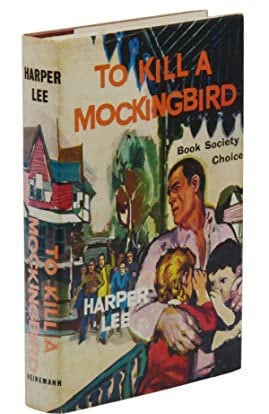I've told this story often. When I was 12, I lived with my elderly grandparents in a small little river town in Central Illinois. My grandpa was the smartest man I've ever known, and he was completely self taught. He told me once that he had learned to read because of a favorite aunt, and that by the time he was in first grade, he had read almost all of the classics. His story is a fascinating one and I'll tell it sometime...but this story is about one treasure that to this day I miss. And I know this sounds silly, but after all these years I still look for it.
My grandpa built a small bookshelf in my room and filled it with old books he bought at auctions and junk shops. We'd also visit our library, a huge stone building built when Carnegie put libraries across the country. One year we'd heard about a book coming out that was written for young adults and had already taken the literary world by storm. To Kill a Mockingbird. Our library wasn't getting it in for months, so my grandpa drove his faithful Studebaker to the big city to buy me a copy. This trip is another story that should be told, but will have to wait until later.
We read the first few chapters on the front porch under the cast of a yellow bug light. I was so entranced by the book that Grandpa told me I could read a little more in my room before I went to sleep. For three nights we did this until the very last word was uttered. I sat there stunned. The story was so real.
My dilemma came when I thought of Miss Flora, the black woman who rented a cabin from my grandpa on a little plot of land next to ours. She had raised five boys all alone, had barely gone to school, and didn't know how to read. We'd become friends because she sometimes helped my grandma with planting the garden and later canning the vegetables. Often, I'd go to her cabin right after supper and read her whatever book my grandpa and I were reading at the time. But how could I read her this book? Although the author, Harper Lee, wrote about her era and her town, could I read such things to the black woman I'd become friends with? I fretted for a couple of days and then ask Grandpa what he thought I should do.
"Miss Biggs knows those words," he said. "But she also knows that you don't feel like those people in the book. You're more like Scout."
"And you're more like Atticus," I told him as I beamed back at him.
I went to Miss Biggs house the following night with the book in my hand. Her eyes widened. "Are you going to read me a good one? Is it a mystery. Or maybe one like that Frankenstein book you read. Oh, that one kept me awake for nights. But I loved it."
I handed her the book. The cover on those first issues showed Atticus and Scout and a black man in front of a courthouse. "It's about a black man who gets accused of something he didn't do," I said.
But, we read that book for about five nights before I finished. All the way through the book for those quiet nights, Miss Biggs didn't react except to smile when something funny or sweet happened. When Atticus goes out of the courtroom and the black watchers in the balcony stand, Miss Biggs stood up too, she was so entranced with the story. When I read the last words, tears ran down Miss Biggs face and she stood up and pretended to busy herself with a bucket of dirty dishes on her sink. I quietly left and the next morning I woke up to a vase of fresh wildflowers by my bed and a note in my grandma's handwriting that said Thank You and was signed Miss Biggs.
I don't know what happened to that book, but the town I lived in was very small with only a couple of thousand residents when I was living there. In my 20s and 30s I went back to my hometown and prowled the junk shops and resale stores hoping to find my copy of To Kill a Mockingbird. I never did, although it started a collection of Mockingbird copies. I now have 72 of them sitting on my living room bookshelf. When I have friends over they always ask me why I have so many copies of the same book. I think of Miss Biggs and my grandpa and I simply tell them it's a story for another day.
The point of this story is that when you buy a vintage or antique item, it might have a story to tell. At the very least, vintage items certainly seem to enrich your life. If anyone out there ever finds a copy of the original To Kill a Mockingbird, and inside there are little scribbles over words, and then a crimped handwritten scripted over those words with what they were before they were marked out, please let me know. It's worth the world to me. And why those words were scribbled out and rewritten, is yet another story for another day. But I promise, I'll get to all of these stories that make it obvious why I collect, and gives a good reason for you collecting too.

